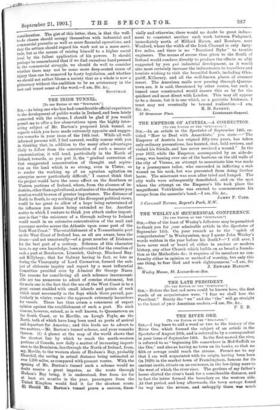THE IRISH TUNNEL.
[To TEE EDITOR OF THE "SPECTATOR:1 Sra,—As being one who has had considerable official experience in the development of public works in Ireland, and been lately connected with the scheme, I should be glad if you would permit me to offer a few observations upon the highly inter- esting subject of Mr. Barton's proposed Irish tunnel, as regards which you have made extremely apposite and sugges- tive remarks in your issue of the 14th inst. While all well- informed persons will, I feel assured, readily concur with you in thinking that, in addition to the many other advantages likely to follow from the construction of such a means of communication, it will tend, particularly in the North of Ireland, towards, as you put it, the " gradual correction of that exaggerated concentration of thought and aspira- tion on the land which is so strong, even in Ulster, as to render the working up of an agrarian agitation an enterprise never particularly difficult," I cannot think that the project would bare the same effect on the Southern or Western portions of Ireland, where, from the absence of in- dustries, other than agricultural, a stimulus of the character you mention would be even of greater importance. The distance of North to South, to say nothing of the divergent political views, would be too great to allow of a hope being entertained of the influence you desire being extended so far. Another matter to which I venture to think you attach undue import- ance is that "the existence of a through railway to Ireland would result in an extensive concentration of the mail and passenger service across the Atlantic upon some port of the Irish West Coast." The establishment of a Transatlantic port on the West Coast of Ireland has, as all are aware, been the dream—and not unnaturally—of a great number of Irishmen for the best part of a century. Schemes of this character have, to my own knowledge, been advocated for the creation of such a port at Berehaven, Limerick, Galway, Blacksod Bay, and Killybegs ; that for Galway having in fact, so late as during the Viceroyalty of Lord Carnarvon, formed the sub- ject of elaborate inquiry and report by a most influential Committee presided over by Admiral Sir George Nares. The reasons for considering all such schemes insurmount- able are too numerous to admit of concise statement, but the main one is the fact that the sea off the West Coast is to a great extent studded with small islands and points of rock which must necessarily in the fogs which there prevail, par- ticularly in winter, render the approach extremely hazardous for vessels. There has thus arisen a consensus of expert opinion against the establishment of such a port. No such reasons, however, extend, as is well known, to Queenstown on the South Coast, or to Moville, on Lough Foyle, on the North, both of which have long been used as ports of arrival and departure for America; and this leads me to advert to two matters,—Mr. Barton's tunnel scheme, and your remarks thereon. (1) A glance at the map of the world shows that the shortest line by which to reach the north-western Portions of. Canada, now daily a matter of increasing import- ance to the Dominion, lies through the North of Ireland, from, say, Moville, to the western shore of Hudson's Bay, probably Churchill, the saving in actual distance being estimated at over 1,200 miles, as compared with present routes. With the opening of Mr. Barton's tunnel such a scheme would no drnibt receive a great impetus, as the route through Hudson's Bay being, it is understood, free from ice for at least six' months in the year, passengers from the United Kingdom would find it far the shortest route. (2) Should. Mr. Barton's tunnel prove a success, finan-
cially and otherwise, there would no doubt be great induce- ment to construct another such work between Fishguard. immediately north of Milford Haven, and Rosslare, near Wexford, where the width of the Irish Channel is only forty- five miles, and there is no " Beauford Dyke to trouble engineers. The means of access thus given to the South of Ireland would conduce directly to produce the effects so ably suggested by you gad industrial development, as it would also most certainly increase the inducements to travellers and tourists wishing to visit the beautiful South, including Glen- gariff, Killarney, and all the well-known places of summer resort. The American mails now passing through Queens- town are, it is said, threatened by other routes, but such a tunnel once constructed would ensure this as by far the quickest and most direct with London. This may all appear to be a dream, but it is one which, as a patriotic Irishman, I trust may not eventually be beyond realisation.—I am,
32 Grosvenor Place. Lieutenant-General.






































 Previous page
Previous page